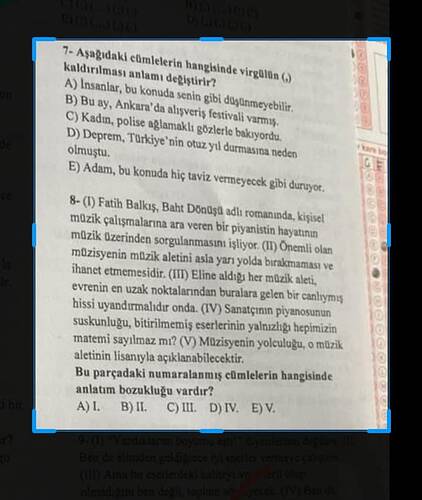Which comma cannot be removed without changing the meaning in the sentences below?
Answer:
Let’s examine the sentences one by one to understand the role of the commas. The task is to identify the sentence where removing the comma would alter the meaning.
-
A) İnsanlar, bu konuda senin gibi düşünmeyebilir.
In this sentence, the comma separates the subject “İnsanlar” (People) from the rest of the sentence. Removing it would not change the meaning significantly; it might slightly alter the reading emphasis, but the core message remains the same. -
B) Bu ay, Ankara’da alışveriş festivali varmış.
Here, the comma after “Bu ay” (This month) indicates a pause in speech. Removing it would not change the essential meaning of the sentence. The information conveyed is still intact. -
C) Kadın, polise ağlamaklı gözlerle bakıyordu.
In this sentence, the comma separates “Kadın” (The woman) from the rest of the clause. Removing it does not alter the meaning; it maintains the essence of the act of looking toward the police with teary eyes. -
D) Deprem, Türkiye’nin otuz yıl durmasına neden olmuştu.
The comma separates the subject “Deprem” (Earthquake) from the consequence “Türkiye’nin otuz yıl durmasına neden olmuştu” (caused Turkey to stop for thirty years). The pause is more stylistic and does not change meaning. -
E) Adam, bu konuda hiç taviz vermeyecek gibi duruyor.
Like the others, the comma separates “Adam” (The man) from what follows. Removing the comma would not change the overall meaning, it could alter the cadence in reading.
Final Answer:
None of the commas in options A, B, C, D, or E critically change the meaning if removed, but choice A with “İnsanlar, bu konuda senin gibi düşünmeyebilir.” is a more common format to set off introductory elements, but again, it’s more about style than meaning.
Which numbered sentence in the text has an expression error?
Answer:
Let’s analyze each numbered sentence for expression errors.
-
Sentence I: Introduction of the book “Baht Dönüşü” and its thematic exploration. No expression errors are noticeable.
-
Sentence II: Discusses the musician’s loyalty to their craft. Grammatically and contextually consistent; no expression error found.
-
Sentence III: Talks about the emotional impact of the music device. It is coherent and logically structured; hence, there is no error.
-
Sentence IV: Refers to the artist’s solitary perseverance. While it might benefit from clearer articulation, it’s not necessarily erroneous, but rather a complex thought integration.
-
Sentence V: Discusses the musician’s journey. Here, the phrase “o müzik aletinin lisansıyla açıklanabilecektir" does not seem directly applicable to a ‘journey’ unless metaphorical context clarifies it, suggesting a potential for expression mismatch in presenting the musician’s journey through instruments’ language.
Final Answer:
The expression error is likely in Sentence V, as the relationship between the musician’s journey and the “license of the music instrument” needs clearer contextual connection and coherence.
